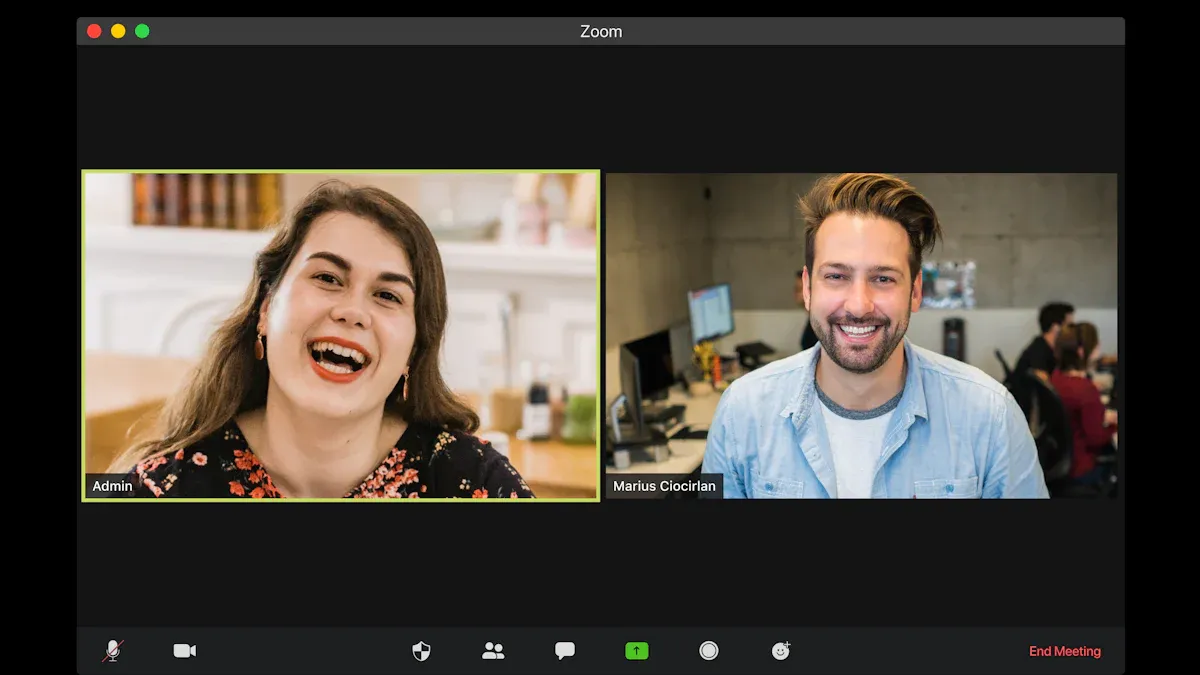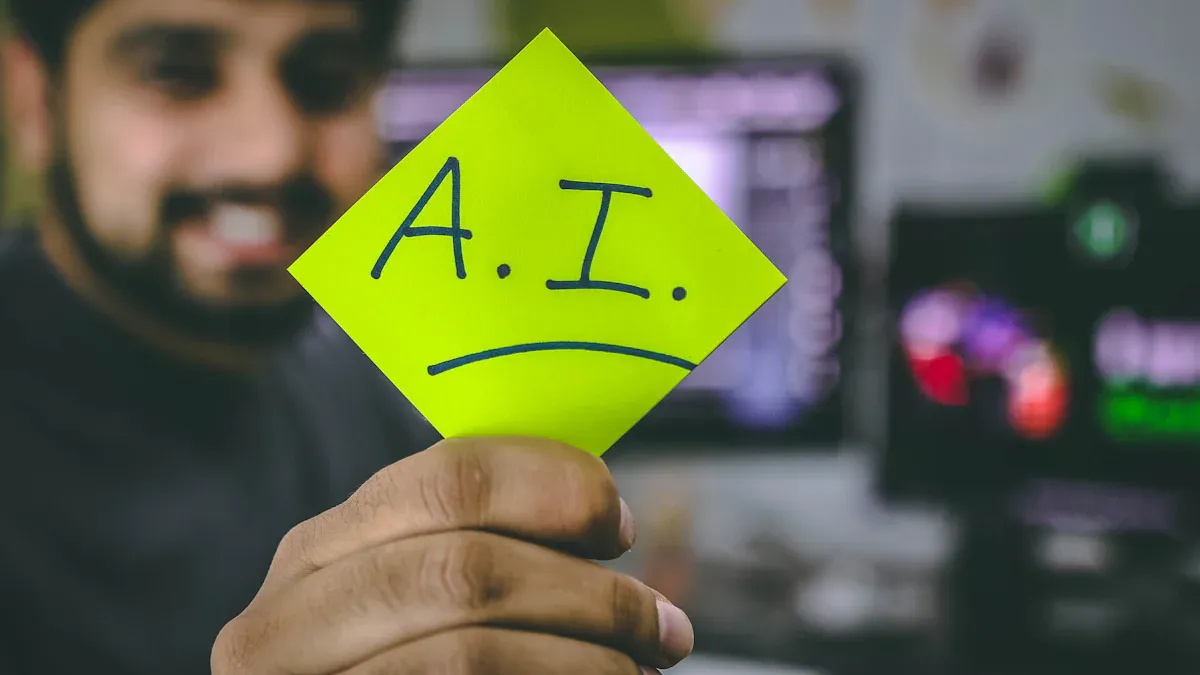Why AI Video Interviewing is Revolutionizing Recruitment in 2025

Imagine a world where the hiring process feels seamless, efficient, and fair. In 2025, AI video interviewing has turned this vision into reality. By addressing long-standing inefficiencies, it empowers you to focus on what truly matters—finding the right talent. Traditional interviews often waste time with scheduling delays and lengthy evaluations. AI transforms this by accelerating the process, cutting time-to-fill positions by up to 50%. It also reduces costs, saving organizations up to 40% by eliminating travel and logistical expenses. With 78% of companies now adopting AI tools, this technology has become a game-changer in recruitment.
AI video interviewing doesn’t just save time and money; it promotes fairness. By minimizing human biases, it ensures every candidate gets an equal chance to shine.
Key Takeaways
AI video interviews save time, cutting hiring by half.
It lowers hiring costs by 40% by removing travel needs.
AI makes hiring fair by reducing bias and treating all equally.
One-way video interviews help people from different places join easily.
Using AI tools improves hiring and makes it more eco-friendly.
Understanding AI Video Interviewing

What is AI Video Interviewing?
AI video interviewing is a transformative approach to recruitment that leverages advanced AI technology to evaluate candidates through pre-recorded AI interviews or live AI-assisted interviews. Unlike traditional methods, this process uses algorithms to analyze responses, assess communication skills, and even gauge cultural fit. It combines automation with data-driven insights to streamline the interview process, making it faster and more efficient.
Key functionalities of AI video interviewing systems include:
Automation to reduce hiring time and boost productivity.
Compliance with labor laws and industry standards.
Transparency in decision-making to promote fairness.
Robust data protection measures to safeguard candidate information.
This innovative approach ensures that every candidate is evaluated consistently, eliminating the inconsistencies often found in human-led interviews.
How AI Enhances the Interview Process
AI revolutionizes the interview process by automating repetitive tasks and improving accuracy. AI-led interviews can quickly review hundreds of applicants, saving you time and effort. Advanced algorithms screen resumes and match candidates to job descriptions, ensuring the right fit for each role.
With AI-assisted interviews, scheduling becomes hassle-free, and evaluations are standardized. This means you can focus on strategic decision-making rather than administrative tasks. AI also provides predictive analytics, helping you identify top talent with precision.
Tip: By adopting AI in recruitment, you can enhance efficiency while maintaining a fair and inclusive hiring process.
The Role of AI in the Future of Recruitment
AI is shaping the future of recruitment by scaling efforts and automating complex processes. It enables structured and unbiased assessments, ensuring every candidate gets a fair chance. Recruiters can now shift their focus from repetitive tasks to strategic functions, such as building relationships and fostering a positive candidate experience.
Trends indicate that AI video interviews will continue to evolve, offering improved decision-making capabilities and creating a more inclusive hiring process. Companies like Unilever and IBM have already embraced this technology, setting a benchmark for others.
While AI technology drives efficiency, it complements rather than replaces human judgment. Maintaining a human touch in candidate interactions ensures engagement and inclusivity, making the recruitment process both effective and empathetic.
Benefits of AI Video Interviewing

Streamlining the Recruitment Process
Automating Screening and Shortlisting
AI video interviewing transforms the recruiting process by automating tasks that once consumed hours of your time. With AI-led interviews, you can achieve efficient screening by analyzing hundreds of applications in minutes. Algorithms evaluate resumes, match candidates to job descriptions, and even assess soft skills. Companies like Unilever, IBM, and Walmart have embraced this technology to streamline their hiring processes.
85% of recruiters report that AI saves time and reduces workload. By automating screening, you can focus on strategic decisions rather than repetitive tasks.
Reducing Time-to-Hire
AI-assisted interviews significantly reduce the time-to-hire. Traditional methods often involve lengthy scheduling and evaluations. AI eliminates these delays by offering one-way video interviews, where candidates respond at their convenience. This flexibility accelerates the hiring process, cutting time-to-fill positions by up to 50%. Faster hiring means you can secure top talent before competitors do.
Promoting Fairness and Diversity
Reducing Bias with Data-Driven Insights
AI technology ensures fairness by relying on objective data rather than subjective opinions. Structured interviews ask all candidates the same questions, creating a level playing field. AI algorithms analyze responses based on measurable criteria, reducing the risk of bias. Diverse hiring panels further enhance fairness by incorporating multiple perspectives.
Encouraging Inclusive Hiring Practices
AI video interviewing expands your applicant pool by removing barriers like geography and time zones. One-way video interviews allow candidates from diverse backgrounds to participate without logistical challenges. This inclusivity accommodates neurodiverse individuals by offering flexible response times and preparation options.
Benefit | Description |
|---|---|
Expands Applicant Pool | Removes geography, time, and resource barriers, allowing more candidates to apply. |
Increases Accessibility | Eliminates barriers that traditional interviews may not address, enhancing inclusivity. |
Accommodations for Neurodiversity | Prepares for diverse needs by offering multiple response attempts and longer preparation times. |
Enhancing the Candidate Experience
Personalized Feedback and Insights
AI-led interviews provide personalized feedback, helping candidates understand their strengths and areas for improvement. This transparency fosters trust and leaves a positive impression. Tailored assessments align with your company’s values, creating an improved candidate experience that resonates with applicants.
Flexible and Accessible Interview Options
One-way video interviews offer unmatched flexibility. Candidates can record responses at their convenience, making the process accessible to those with busy schedules or in different time zones. AI-assisted interviews also provide various formats, such as live or asynchronous options, ensuring a seamless experience for every applicant.
By prioritizing flexibility and personalization, you can create a hiring process that values candidates’ time and effort.
Cost and Resource Efficiency
AI video interviewing is a game-changer when it comes to saving costs and optimizing resources in the hiring process. By automating repetitive tasks, you can reduce the need for manual labor and focus on strategic decisions. This efficiency not only saves time but also cuts down on expenses that traditional interviews often require.
Think about the costs associated with in-person interviews. Travel, accommodation, and venue expenses can quickly add up, especially when hiring for multiple positions. AI eliminates these costs by enabling virtual interviews. Candidates can participate from anywhere, and you can evaluate them without logistical challenges.
AI also reduces the need for extensive administrative support. Scheduling interviews, coordinating with candidates, and managing paperwork become effortless with AI tools. This streamlined approach allows your team to allocate resources to other critical areas of the hiring process.
Did you know? Companies using AI for hiring report up to a 40% reduction in recruitment costs.
Another significant advantage is scalability. AI can handle a high volume of interviews simultaneously, something that would be impossible for a human team. Whether you're hiring for one role or a hundred, AI ensures the process remains efficient and cost-effective.
By adopting AI video interviewing, you not only save money but also create a more sustainable hiring model. The reduced need for physical resources and travel contributes to a greener, more eco-friendly recruitment process.
When you invest in AI, you invest in a smarter, more resource-efficient future for your organization.
Challenges of AI in Recruitment
Data Privacy and Security Concerns
Protecting Candidate Information
AI systems rely on vast amounts of data to function effectively. This includes sensitive candidate information such as resumes, video recordings, and assessment results. Protecting this data is critical to maintaining trust and avoiding breaches. You must ensure robust security measures, such as encryption and access controls, to safeguard candidate information. Unauthorized access or data leaks can damage your organization's reputation and lead to legal consequences.
To address these challenges, focus on transparency. Inform candidates about how their data will be used and stored. This builds trust and ensures compliance with privacy laws. Additionally, conduct regular audits to identify vulnerabilities and implement strategies to mitigate risks.
Ensuring Compliance with Regulations
Navigating the complex landscape of data privacy laws is essential when using AI in the hiring process. Regulations like GDPR and CCPA require you to handle candidate data responsibly. Non-compliance can result in hefty fines and reputational damage.
You can ensure compliance by adopting practices such as Data Protection Impact Assessments (DPIAs). These assessments help you evaluate the risks associated with AI systems and ensure they align with legal standards. Providing data privacy training to your team also enhances awareness and reduces the likelihood of errors.
Ethical Issues in AI Decision-Making
Addressing Algorithmic Bias
AI tools can unintentionally perpetuate biases if trained on flawed data. This can lead to discriminatory outcomes in hiring, affecting candidates based on gender, race, or other attributes. To combat this, you should prioritize diverse and unbiased datasets during the training phase. Techniques like adversarial training and data augmentation can help reduce bias and improve fairness.
Investing in tools like Blendoor, which removes identifying information from candidate profiles, can also promote equitable hiring practices. By addressing algorithmic bias, you create a more inclusive recruiting process that values every candidate equally.
Maintaining Transparency
Transparency is vital when using AI technology in recruitment. Candidates often feel skeptical about AI-driven decisions, with 85% of Americans expressing concerns about fairness. You can alleviate these worries by clearly explaining how AI evaluates candidates and ensuring decisions are based on measurable criteria.
Regularly updating your AI systems and sharing insights into their functionality fosters trust. This approach not only reassures candidates but also strengthens your organization's reputation as a fair and ethical employer.
Limitations in Human Behavior Analysis
Balancing AI with Human Judgment
AI excels at analyzing data and identifying patterns, but it cannot fully replace human intuition. You should view AI as a tool that enhances your capabilities rather than a substitute for human judgment. For example, while AI can streamline screening, human recruiters bring empathy and cultural understanding to the hiring process.
Encourage collaboration between AI and your team. Train recruiters to interpret AI insights effectively and ensure candidate interactions remain personalized. This balance creates a hiring process that is both efficient and human-centric.
Recognizing Context and Nuance
AI struggles to understand the subtleties of human behavior, such as tone, body language, and cultural nuances. These factors play a crucial role in candidate assessment and cannot be overlooked. You should combine AI's efficiency with your ability to evaluate context and emotional intelligence.
By integrating AI with human expertise, you ensure a holistic approach to recruitment. This not only improves decision-making but also enhances the candidate experience, making your organization stand out in a competitive hiring landscape.
Implementing AI Video Interviewing
Best Practices for Organizations
Training Teams to Use AI Tools
To maximize the potential of AI tools in your recruiting process, you need to prepare your team effectively. Training ensures your recruiters can interpret AI insights and use the tools efficiently. Start by defining clear objectives, such as improving hire quality or reducing time-to-fill. Provide hands-on training sessions that focus on the features of AI tools and their integration into your existing hiring workflows.
Interactive workshops and webinars can accommodate different learning styles, making the training more engaging. Encourage a culture of continuous learning by offering access to online courses and industry webinars. Regularly monitor performance metrics, such as screening accuracy and candidate quality, to assess the effectiveness of your training program.
Training Method | Description |
|---|---|
Establish Objectives | Define what you aim to achieve with AI tools, such as improving hire quality or reducing time-to-fill. |
Tool-Specific Training | Provide hands-on training on the features and integration of AI tools into existing HR processes. |
Best Practices | Share guidelines for effective AI tool usage, including data accuracy and ethical standards. |
Interactive Training Sessions | Use workshops and webinars to accommodate different learning styles and ensure hands-on practice. |
Continuous Learning Culture | Encourage ongoing education through resources like online courses and industry webinars. |
Setting Clear Evaluation Standards
AI tools thrive on consistency. Establishing clear evaluation standards ensures that your hiring process remains fair and objective. Define measurable criteria for assessing candidates, such as communication skills, technical expertise, or cultural fit. Standardized benchmarks help AI systems deliver accurate insights while maintaining transparency.
By setting clear standards, you create a structured and unbiased recruiting process that benefits both your team and candidates.
Choosing the Right Tools
Features to Consider
Selecting the right AI tools for your organization requires careful consideration of their features. Look for tools that offer real-time coaching, bias detection, and automated scheduling. Advanced features like sentiment analysis, DEI analytics dashboards, and interview intelligence metrics can enhance your hiring process.
Other essential features include cross-device compatibility, automated transcription in multiple languages, and customizable workflows. These capabilities ensure flexibility and scalability, allowing you to adapt to diverse hiring needs.
Comparing Leading Platforms
When comparing platforms, focus on how well they align with your goals. Evaluate their ability to integrate with your existing systems and their support for human-AI collaboration. Platforms with robust analytics dashboards and customizable scoring rubrics provide deeper insights into candidate performance.
Criteria | Description |
|---|---|
Human-AI Collaboration | AI insights should support human judgment, balancing efficiency with personal interaction. |
Scalability & Flexibility | AI models should accommodate different hiring needs, ensuring versatility. |
Customizable Interview Workflows | AI should allow recruiters to tailor interview structures based on job role and organizational needs. |
Integration of Behavioral Science | AI should incorporate psychological insights into candidate assessments for deeper analysis. |
Ensuring Ethical and Legal Compliance
Regular Audits and Updates
Regular audits of your AI systems are essential for maintaining ethical standards. These audits help identify biases, ensure diverse representation, and align AI tools with your hiring objectives. By reviewing data inputs and decision-making processes, you can correct errors and improve fairness.
Transparent Communication with Candidates
Transparency builds trust. Inform candidates about how AI tools evaluate their applications and how their data is stored. Document your processes and train your team on compliance measures. Allow for human intervention in decision-making to balance technology with empathy.
Ethical AI practices not only protect your organization but also create a positive experience for candidates.
AI video interviewing is reshaping recruitment by making the hiring process faster, fairer, and more efficient. With AI, you can quickly review numerous applicants and automate interviews, saving time and reducing workload. In fact, 85% of recruiters report significant time savings, and AI can cut time-to-fill positions by up to 50%.
While challenges like privacy and ethical concerns exist, you can overcome them with the right strategies. Implement robust encryption, conduct regular audits, and ensure transparency to protect candidate data. By using diverse training data and monitoring AI outputs, you can also address bias and promote fairness.
Organizations embracing AI video interviewing in 2025 gain a competitive edge. With 78% of companies adopting AI tools, you can achieve 60% faster hiring processes, reduce costs by 40%, and deliver exceptional candidate experiences. By adopting this technology, you position your organization as a leader in the future of recruitment.
FAQ
What makes AI video interviewing better than traditional methods?
AI video interviewing saves time and reduces costs. It automates repetitive tasks like screening and scheduling. You can focus on strategic decisions while AI handles the heavy lifting. Plus, it promotes fairness by minimizing bias and ensuring consistent evaluations for all candidates.
How does AI ensure fairness in hiring?
AI uses data-driven insights to evaluate candidates objectively. It applies the same criteria to everyone, eliminating subjective judgments. By analyzing responses based on measurable factors, AI creates a level playing field. This approach encourages diversity and inclusivity in your hiring process.
Is AI video interviewing suitable for all industries?
Yes! AI video interviewing adapts to various industries, from tech to healthcare. Its customizable workflows and advanced analytics make it versatile. Whether you're hiring for creative roles or technical positions, AI tools can streamline your recruitment process and help you find the right talent.
How can I ensure candidates feel comfortable with AI interviews?
Transparency is key. Explain how AI evaluates their responses and how their data is protected. Offer flexible options like one-way interviews to accommodate their schedules. Providing clear instructions and personalized feedback also helps candidates feel valued and engaged.
What if AI makes a mistake in evaluating a candidate?
AI complements human judgment but doesn’t replace it. Always review AI-generated insights before making decisions. Combining AI's efficiency with your intuition ensures a balanced approach. Regular audits of AI tools also help identify and correct any errors, improving accuracy over time.
See Also
The Transformation of Talent Acquisition Through AI Recruitment Systems
AI Recruitment Tools Shaping Contemporary Hiring Approaches
Smart Interview Solutions Offered by AI Hiring Software
Effective Tips for Smooth Interviews Using AI Recruiting Tools
Enhance Your Recruitment Efficiency with an ATS Transformation
From recruiting candidates to onboarding new team members, MokaHR gives your company everything you need to be great at hiring.
Subscribe for more information

